中西婚姻观差异英文
- 格式:pptx
- 大小:3.36 MB
- 文档页数:17
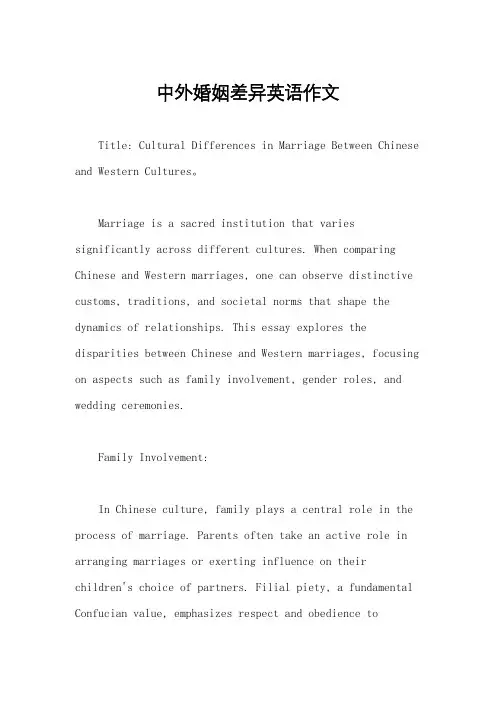
中外婚姻差异英语作文Title: Cultural Differences in Marriage Between Chinese and Western Cultures。
Marriage is a sacred institution that varies significantly across different cultures. When comparing Chinese and Western marriages, one can observe distinctive customs, traditions, and societal norms that shape the dynamics of relationships. This essay explores the disparities between Chinese and Western marriages, focusing on aspects such as family involvement, gender roles, and wedding ceremonies.Family Involvement:In Chinese culture, family plays a central role in the process of marriage. Parents often take an active role in arranging marriages or exerting influence on theirchildren's choice of partners. Filial piety, a fundamental Confucian value, emphasizes respect and obedience toparents' wishes. As a result, Chinese couples may face pressure to marry someone approved by their families, and the decision-making process often involves considering familial expectations and preferences.On the contrary, Western marriages typically prioritize individual autonomy and personal choice. While familial support and approval are valued, the ultimate decision to marry rests with the individuals involved. Western couples have more freedom to choose their partners based on compatibility, love, and shared values, rather than solely on familial considerations. This independence in decision-making can lead to greater personal fulfillment but may also result in strained family relationships if parents disapprove of the chosen partner.Gender Roles:Another significant difference between Chinese and Western marriages lies in gender roles and expectations within the relationship. Traditional Chinese gender roles are often more rigid, with distinct expectations for menand women. Historically, men have been viewed as the primary breadwinners and decision-makers, while women are expected to prioritize family duties and domestic responsibilities.In Western societies, there has been a gradual shift towards more egalitarian gender roles within marriages. Women have gained greater independence and opportunitiesfor education and employment, leading to a more balanced division of household labor and decision-making responsibilities. Modern Western marriages often prioritize equality and mutual respect between partners, with both individuals contributing to financial support and decision-making processes.Wedding Ceremonies:Wedding ceremonies in Chinese and Western cultures also differ in their customs and traditions. Chinese weddings are often steeped in centuries-old rituals and symbolism, reflecting cultural beliefs and values. Traditional Chinese weddings may include customs such as the exchange ofbetrothal gifts, the tea ceremony, and the use of auspicious colors like red and gold. These ceremonies serve to honor ancestors, bring blessings upon the couple, and symbolize the union of two families.Western wedding ceremonies vary widely depending on cultural and religious backgrounds, but they often emphasize personalization and individual expression. Couples have the freedom to tailor their weddings toreflect their unique personalities and preferences. Western weddings may include customs such as exchanging vows, exchanging rings, and hosting receptions with music, dancing, and elaborate decorations. The emphasis is often on celebrating love and commitment in the presence of family and friends.In conclusion, the institution of marriage manifests differently in Chinese and Western cultures due to variations in familial involvement, gender roles, and wedding traditions. While Chinese marriages tend to be influenced by familial expectations and adhere totraditional gender norms, Western marriages prioritizeindividual choice, equality, and personal expression. Understanding these cultural differences is crucial for fostering cross-cultural awareness and respecting diverse perspectives on love and marriage.。
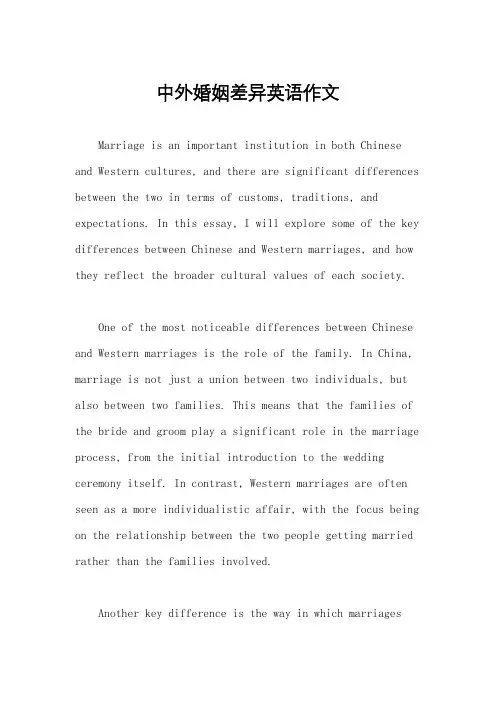
中外婚姻差异英语作文Marriage is an important institution in both Chinese and Western cultures, and there are significant differences between the two in terms of customs, traditions, and expectations. In this essay, I will explore some of the key differences between Chinese and Western marriages, and how they reflect the broader cultural values of each society.One of the most noticeable differences between Chinese and Western marriages is the role of the family. In China, marriage is not just a union between two individuals, but also between two families. This means that the families of the bride and groom play a significant role in the marriage process, from the initial introduction to the wedding ceremony itself. In contrast, Western marriages are often seen as a more individualistic affair, with the focus being on the relationship between the two people getting married rather than the families involved.Another key difference is the way in which marriagesare arranged. In China, arranged marriages were once common, with parents playing a central role in finding a suitable match for their children. While this practice has becomeless common in modern China, there is still a strong emphasis on the compatibility of the two families and the social status of the potential spouse. In the West,arranged marriages are rare, and the emphasis is on the individual's choice of partner based on love and personal compatibility.The wedding ceremony itself is also different in China and the West. In China, the wedding ceremony is often a grand affair, with many traditional customs and rituals, such as the tea ceremony and the exchanging of gifts. In contrast, Western weddings are often more focused on the personal preferences of the couple, with a greater emphasis on individuality and creativity in the ceremony and reception.Gender roles in marriage also differ between Chineseand Western cultures. In China, there is often a greater emphasis on traditional gender roles, with the husbandbeing the primary breadwinner and the wife taking on more domestic responsibilities. In the West, there is a greater emphasis on equality and shared responsibilities within the marriage.Finally, divorce is viewed differently in Chinese and Western cultures. In China, divorce was once highly stigmatized, and there was a strong emphasis on maintaining the stability of the family unit. However, attitudes towards divorce are changing in modern China, with divorce rates rising as social attitudes evolve. In the West, divorce is more accepted and is seen as a viable option for couples who are no longer compatible.In conclusion, Chinese and Western marriages differ in many ways, reflecting the broader cultural values and traditions of each society. While there are certainly differences, it is important to recognize that both Chinese and Western marriages have their own strengths and challenges, and that there is no one-size-fits-all approach to marriage. By understanding and respecting the differences between these two cultural traditions, we cangain a greater appreciation for the diversity of human relationships.。
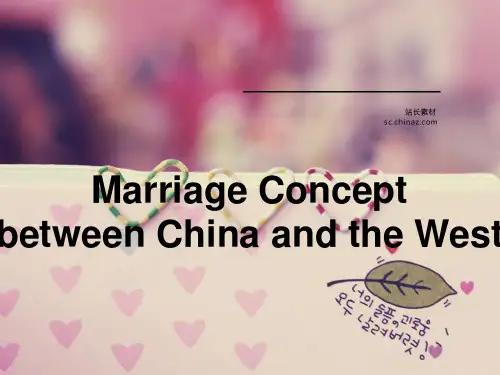
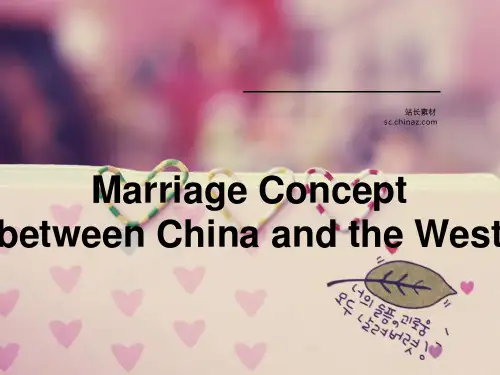
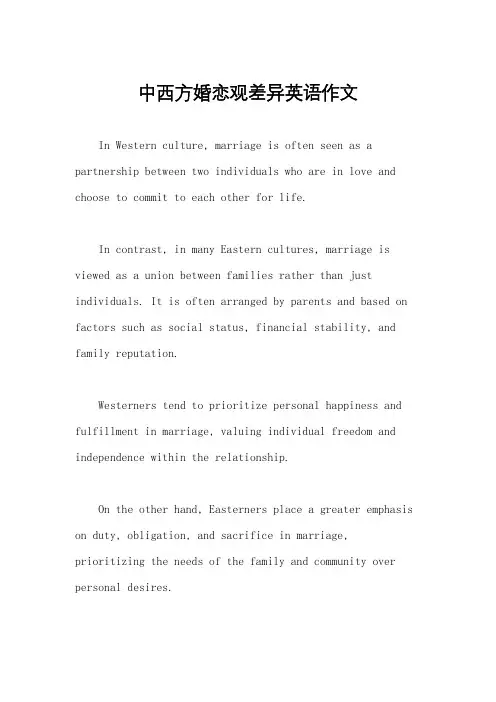
中西方婚恋观差异英语作文In Western culture, marriage is often seen as a partnership between two individuals who are in love and choose to commit to each other for life.In contrast, in many Eastern cultures, marriage is viewed as a union between families rather than just individuals. It is often arranged by parents and based on factors such as social status, financial stability, and family reputation.Westerners tend to prioritize personal happiness and fulfillment in marriage, valuing individual freedom and independence within the relationship.On the other hand, Easterners place a greater emphasis on duty, obligation, and sacrifice in marriage,prioritizing the needs of the family and community over personal desires.In Western societies, divorce is more common and socially acceptable, with individuals encouraged to leave unhappy marriages in search of personal happiness.In Eastern cultures, divorce is often stigmatized and seen as a failure, leading many couples to stay in unhappy marriages for the sake of family honor and stability.Overall, while both Western and Eastern cultures value the institution of marriage, the underlying beliefs and expectations surrounding it can vary significantly.。
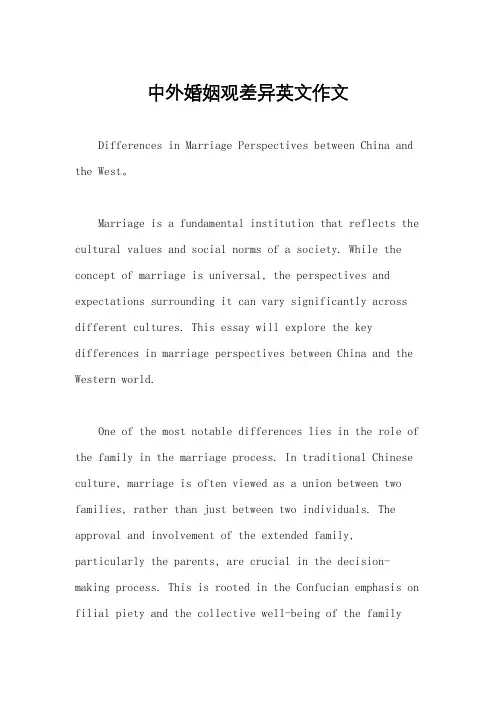
中外婚姻观差异英文作文Differences in Marriage Perspectives between China and the West。
Marriage is a fundamental institution that reflects the cultural values and social norms of a society. While the concept of marriage is universal, the perspectives and expectations surrounding it can vary significantly across different cultures. This essay will explore the key differences in marriage perspectives between China and the Western world.One of the most notable differences lies in the role of the family in the marriage process. In traditional Chinese culture, marriage is often viewed as a union between two families, rather than just between two individuals. The approval and involvement of the extended family,particularly the parents, are crucial in the decision-making process. This is rooted in the Confucian emphasis on filial piety and the collective well-being of the familyunit. In contrast, Western marriage traditions tend to place a greater emphasis on individual autonomy and the romantic relationship between the two partners.Another significant difference is the importance placed on practical considerations in the marriage decision. In China, factors such as financial stability, social status, and compatibility in terms of family background and values often take precedence over personal attraction or emotional connection. This is partly due to the traditional Chinese belief that a successful marriage is essential for social stability and the continuation of the family lineage. Western marriage, on the other hand, is more heavily influenced by the idea of romantic love and the pursuit of individual happiness.The role of gender in marriage also differs between the two cultures. In traditional Chinese society, there is a more pronounced gender hierarchy, with the husbandtypically holding a higher status and more decision-making power within the household. This is reflected in the practice of patrilocal residence, where the bride movesinto the groom's family home after marriage. In contrast, Western marriage tends to emphasize greater gender equality, with both partners having more equal rights and responsibilities within the relationship.The expectations and responsibilities of marriedcouples also vary. In China, the primary focus of marriageis often on fulfilling familial duties, such as bearing children, caring for the elderly, and maintaining thefamily's social standing. The individual's needs anddesires may be subordinate to the collective interests of the family. Western marriage, on the other hand, places a stronger emphasis on personal fulfillment, self-expression, and the pursuit of individual goals and aspirations within the marital relationship.Furthermore, the attitudes towards divorce and remarriage differ significantly between the two cultures. Historically, divorce has been more socially acceptable and less stigmatized in the West, where it is often seen as a means of escaping an unhappy or dysfunctional marriage. In China, however, divorce has traditionally been viewed as afailure to uphold the Confucian values of loyalty and harmony within the family, and it has often been accompanied by social stigma and personal shame.These cultural differences in marriage perspectives have important implications for cross-culturalrelationships and marriages. Couples from China and the West may face challenges in reconciling their divergent expectations and values, which can lead to conflicts and misunderstandings. Effective communication, mutual understanding, and a willingness to compromise areessential for navigating these cultural differences and building a successful cross-cultural marriage.In conclusion, the differences in marriage perspectives between China and the Western world are rooted in their respective cultural traditions, social structures, and value systems. While these differences can present challenges, they also offer opportunities for cross-cultural learning and the enrichment of the marital experience. By understanding and respecting these cultural differences, couples can work towards building stronger,more fulfilling, and more harmonious marriages that transcend national and cultural boundaries.。
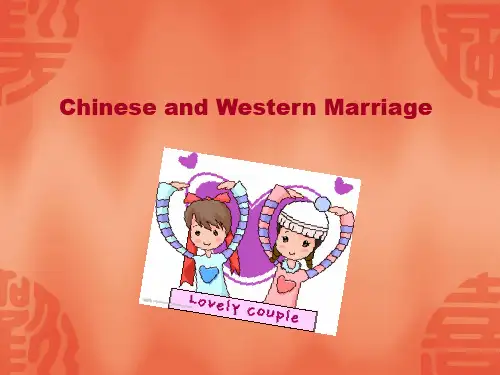
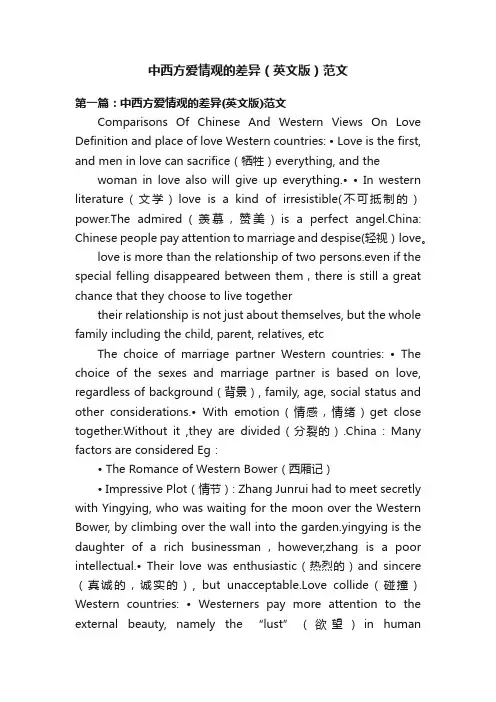
中西方爱情观的差异(英文版)范文第一篇:中西方爱情观的差异(英文版)范文Comparisons Of Chinese And Western Views On Love Definition and place of love Western countries: • Love is the first, and men in love can sacrifice(牺牲)everything, and the woman in love also will give up everything.• • In western literature(文学)love is a kind of irresistible(不可抵制的)power.The admired(羡慕,赞美)is a perfect angel.China: Chinese people pay attention to marriage and despise(轻视)love。
love is more than the relationship of two persons.even if the special felling disappeared between them,there is still a great chance that they choose to live togethertheir relationship is not just about themselves, but the whole family including the child, parent, relatives, etcThe choice of marriage partner Western countries: • The choice of the sexes and marriage partner is based on love, regardless of background(背景), family, age, social status and other considerations.• With emotion(情感,情绪)get close together.Without it ,they are divided(分裂的).China : Many factors are considered Eg:• The Romance of Western Bower(西厢记)• Impressive Plot(情节): Zhang Junrui had to meet secretly with Yingying, who was waiting for the moon over the Western Bower, by climbing over the wall into the garden.yingying is the daughter of a rich businessman,however,zhang is a poor intellectual.• Their love was enthusiastic(热烈的)and sincere (真诚的,诚实的), but unacceptable.Love collide(碰撞)Western countries: • Westerners pay more attention to the external beauty, namely the “lust”(欲望)in humannature.Example: Romeo and Juliet Romeo and Juliet falling in love at first sight is based on both sides of the beauty.They don’t have deep communications.They make judgments according to the impressions(观感)of the opposite(对面的)person’s looks.China: The Oriental(东方人的)pay more attention to the inner beauty, namely “passion"(激情,热情)side in human nature.Example: Liang Shanbo and Zhu Yingtai Liang Shanbo and Zhu Yingtai have quite a long time for communications such as three years’ classmates reading.In daily contact, Zhu Yingtai was attracted by Liang’s talent and connotation(内涵)and gave him her heart.The expressions of loveWestern countries: Direct and straightforward(坦率的)frankly、open、romantic、egardless(不注意的)of everything Eg:'I loved you.I never shall.That's the truth, Roy.I never shall.' ‘我爱你,从未爱过别人,永远不会,这是真的,罗伊,永远不会。
![[实用参考]中西婚姻观差异(英文)](https://uimg.taocdn.com/64bb0931fad6195f312ba67e.webp)
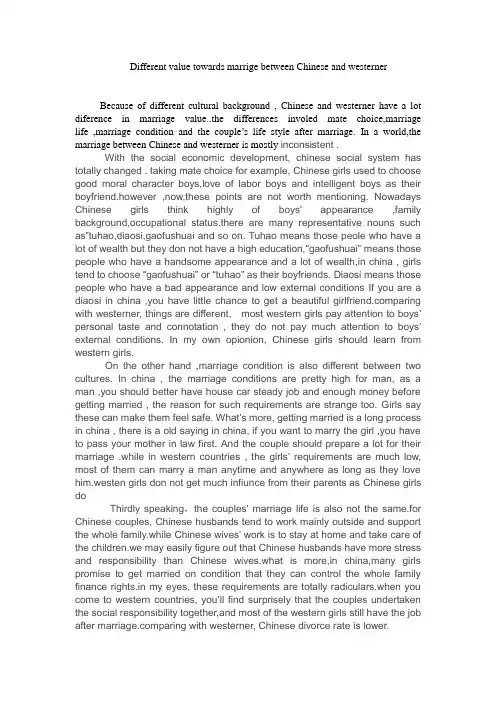
Different value towards marrige between Chinese and westerner Because of different cultural background , Chinese and westerner have a lot diference in marriage value..the differences involed mate choice,marriage life ,marriage condition and the couple’s life style after marriage. In a world,the marriage between Chinese and westerner is mostly inconsistent .With the social economic development, chinese social system has totally changed . taking mate choice for example, Chinese girls used to choose good moral character boys,love of labor boys and intelligent boys as their boyfriend.however ,now,these points are not worth mentioning. Nowadays Chinese girls think highly of boys’appearance ,family background,occupational status.there are many representative nouns such as”tuhao,diaosi,gaofushuai and so on. Tuhao means those peole who have a lot of wealth but they don not have a high education,”gaofushuai” means those people who have a handsome appearance and a lot of wealth,in china , girls tend to choose “gaofushuai” or “tuhao” as their boyfriends. Diaosi means those people who have a bad appearance and low external conditions If you are a diaosi in china ,you have little chance to get a beautiful paring with westerner, things are different, most western girls pay attention to boys’personal taste and connotation , they do not pay much attention to boys’external conditions. In my own opionion, Chinese girls should learn from western girls.On the other hand ,marriage condition is also different between two cultures. In china , the marriage conditions are pretty high for man, as a man ,you should better have house car steady job and enough money before getting married , the reason for such requirements are strange too. Girls say these can make them feel safe. What’s more, getting married is a long process in china , there is a old saying in china, if you want to marry the girl ,you have to pass your mother in law first. And the couple should prepare a lot for their marriage .while in western countries , the girls’requirements are much low, most of them can marry a man anytime and anywhere as long as they love him.westen girls don not get much infiunce from their parents as Chinese girls doThirdly speaking,the couples’marriage life is also not the same.for Chinese couples, Chinese husbands tend to work mainly outside and support the whole family.while Chinese wives’ work is to stay at home and take care of the children.we may easily figure out that Chinese husbands have more stress and responsibility than Chinese wives.what is more,in china,many girls promise to get married on condition that they can control the whole family finance rights.in my eyes, these requirements are totally radiculars.when you come to western countries, you’ll find surprisely that the couples undertaken the social responsibility together,and most of the western girls still have the job after paring with westerner, Chinese divorce rate is lower.Finally speaking,it is about the couples’s lifestyle after marriage .chinese couples countribute their most time to their children eduction. Many common couples have to pay off the mortagage. as a matter of fact, Chinese couples’ life is harder,on the contrary, western couples life after marriage is more fantastic and wonderful. Because many western couples do not have children, so they have more time to enjoy their life ,meanwhile,they also have little burdern.western couples prefer to traveling ,they prefer consuming. While Chinese couples tend to deposite their money in the bank for a rainly day.In a word, there are many reasons to cause these phenomenons. There are 2 main accounts. First ,it is the environment. China is a developing country ,the inflationary force and house price stress force the couples to be realistic not romantic;while in western countries, most of them are developed countries.most of families are well~off,so they choose to be romantic.second,it is the cultural character.as we all know,westerners are openminded and keeping pace with the times.though,Chinese are conservative and cautious. Having realized the reasons, it is no wonder to find so many differences in the values towards marriage between Chinese and westerner.That is all about it ! thank you !。
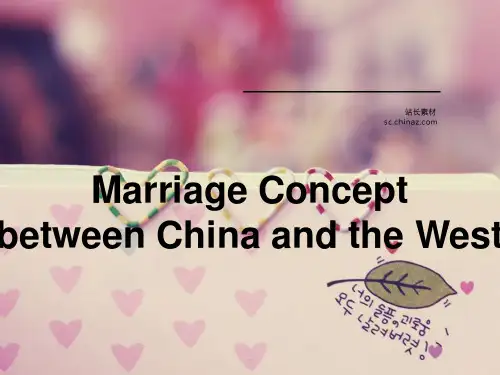
最新中西方爱情观的差异(英文版)Comparisons Of Chinese And Western Views On LoveDefinition and place of loveWestern countries:Love is the first, and men in love can sacrifice(牺牲)everything, and the woman in love also will give up everything.In western literature(文学)love is a kind of irresistible(不可抵制的)power. ?The admired(羡慕,赞美)is a perfect angel.China: Chinese people pay attention to marriage and despise(轻视)love。
love is more than the relationship of two persons.even if the special felling disappeared between them ,there is still a greatchance that they choose to live togethertheir relationship is not just about themselves, but the whole family includingthe child, parent, relatives, etcThe choice of marriage partnerWestern countries:The choice of the sexes and marriage partner is based on love, regardless of background(背景), family, age, social status and other considerations. ?With emotion(情感,情绪)get close together. Without it ,they are divided (分裂的).China : Many factors are consideredEg:The Romance of Western Bower(西厢记)Impressive Plot(情节): Zhang Junrui had to meet secretly with Yingying, who was waiting for the moon over the Western Bower, by climbing over thewall into the garden. yingying is the daughter of a rich businessman ,however,zhang is a poor intellectual.Their love was enthusiastic(热烈的)and sincere(真诚的,诚实的), but unacceptable.Love collide(碰撞)Western countries:Westerners pay more attention to the external beauty, namely the “lust”(欲望)in human nature.Example: Romeo and JulietRomeo and Juliet falling in love at first sight is based on both sides of the beauty. They don’t have deep communications. They make judgments according to the impressions(观感)of the opposite(对面的)person’s looks.China:The Oriental(东方人的)pay more attention to the inner beauty, namely “passion"(激情,热情)side in human nature.Example: Liang Shanbo and Zhu YingtaiLiang Shanbo and Zhu Yingtai have quite a long time for communications suc h as three years’classmates reading. In daily contact, Zhu Yingtai was attracted by Liang’s talent and connotation(内涵)and gave him her heart.The expressions of loveWestern countries: Direct and straightforward(坦率的)frankly、open、romantic 、egardless(不注意的)of everything Eg:'I loved you. I never shall. That's the truth, Roy. I never shall.'‘我爱你,从未爱过别人,永远不会,这是真的,罗伊,永远不会。